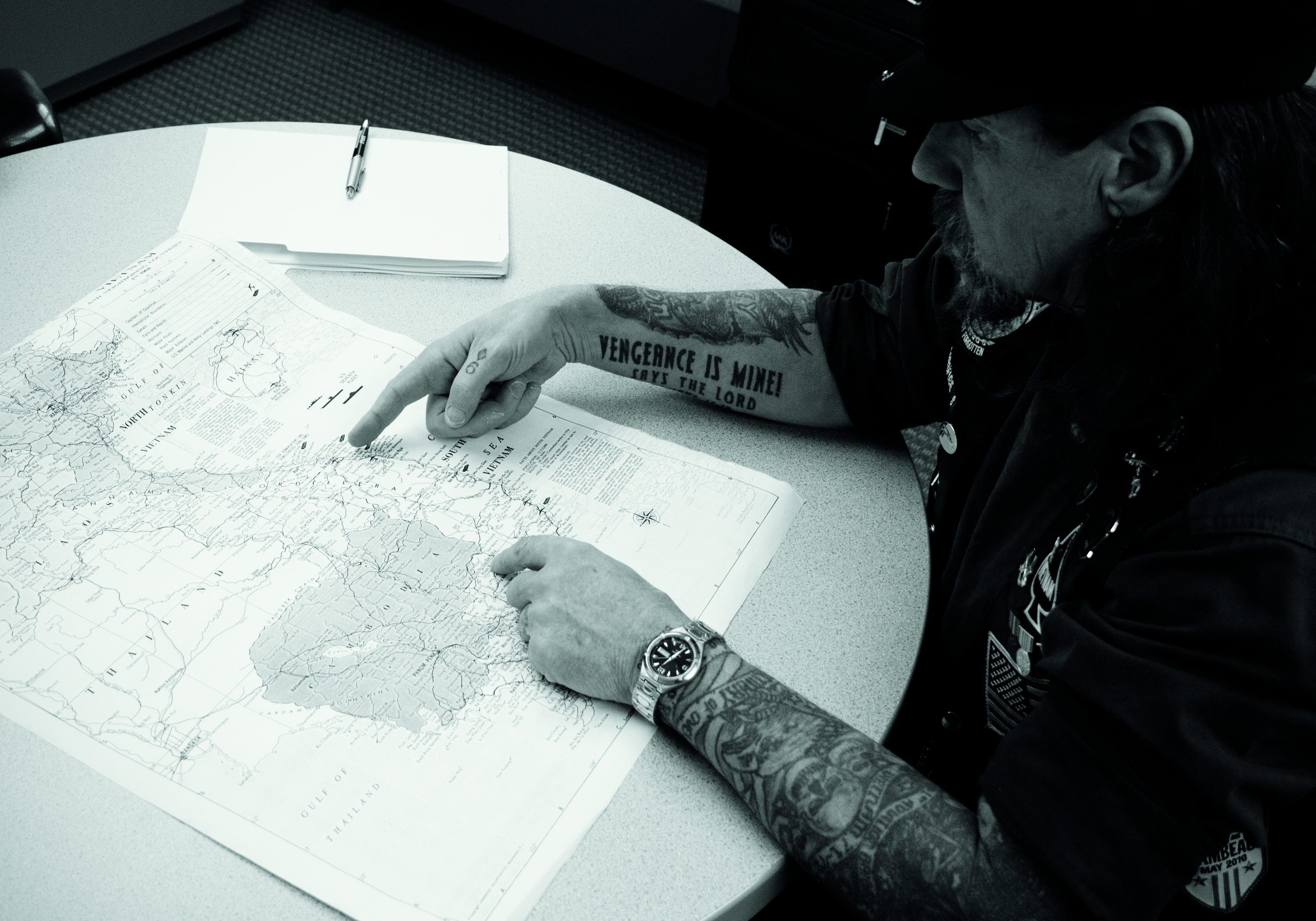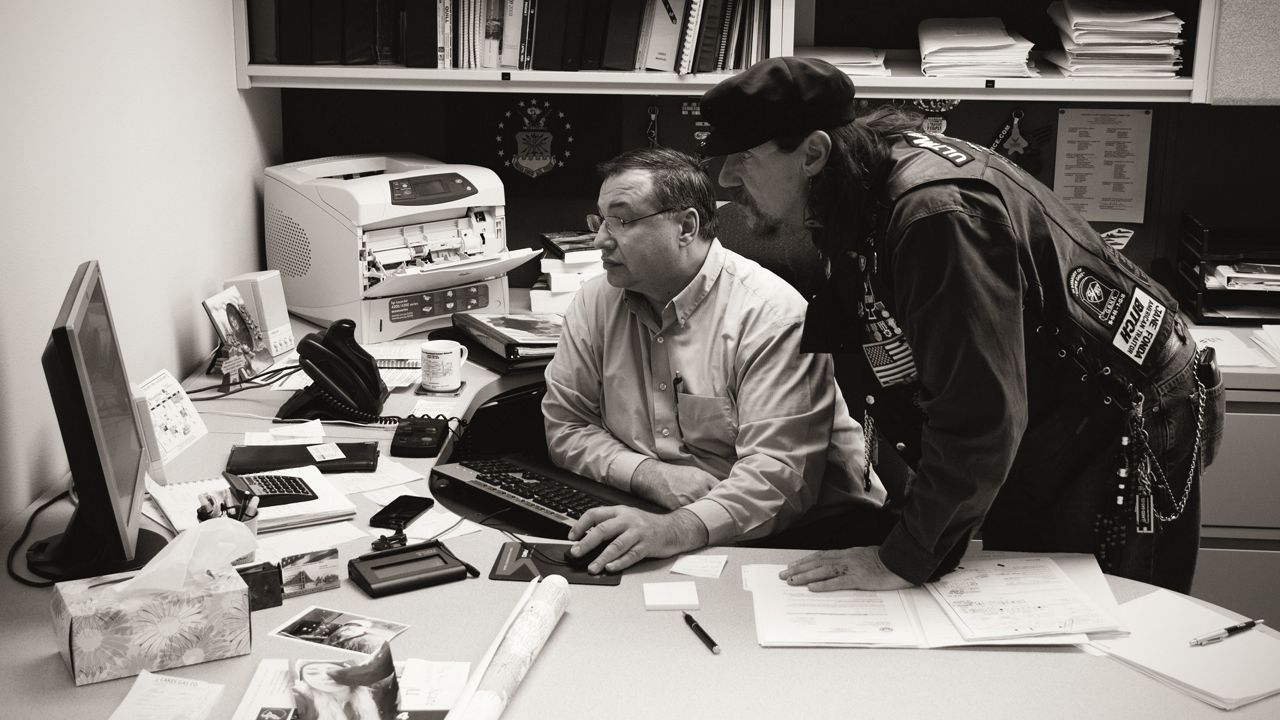GREEN BAY, Wis. — Joe Aulik hears the dark stories. The kind no one really wants to hear and even fewer are willing to tell.
“A World War II veteran came into my office in Kewaunee,’’ Aulik, who at the time worked at the Kewaunee County Veteran Services Office. “(John L. of Kewaunee) fought in the Battle of the Bulge. He found himself in trouble and had to take the frozen bodies of his fellow fallen soldiers on the ground and stack them to form a bunker in order to continue to fight the Germans.
“He was, oh man, he had nightmares, night sweats, would wake up screaming while sleeping. You hear a lot of stories from the wives… I call them the silent sufferers. It is the story nobody hears, the sacrifice these people have to live with the rest of their lives. It’s a whole subculture no one knows about.”
Knowledge is what Joe is selling with this story. Nothing more. He knows there are thousands upon thousands of military veterans and their families suffering with no idea where to go for help.
And that’s what he and his colleagues at the Brown County Veterans Service Office – and similar offices across the state - are tasked to do. They have the tools to help veterans, their partners, and their children collect the benefits they have earned.
But therein lies the rub.
A 2010 study by the Department of Veterans Affairs, surveying veterans from the WWII, Korean, Vietnam, Persian Gulf and Iraq, Afghanistan wars, showed well over half said they had little to no understanding of their health care, education and life insurance benefits due them.
And from Joe’s perspective, nothing has really improved over the past decade.
“Every week we talk to veterans who say, ‘I didn’t know this was available,’” he said. “So many are going without; it’s enough to make your head spin. These benefits —they can totally change your life.”
Don Fenlon of Green Bay was just looking to preplan his funeral.
He served three years in the Army starting in 1968 and did one tour of duty in Vietnam. He contracted two different types of malaria while there, once having to be airlifted to a hospital after passing out with a 106-degree temperature.
“I remember I was already in the air and I remember the tongue suppressor he was using was somebody’s comb,’’ said Don, “and that’s when I went out again.”
When Don returned home, life was not all that easy.
His two sons were both born with birth defects, a byproduct of his exposure to Agent Orange, though both are healthy today. Years later, he developed prostate cancer, another unwanted consequence of Agent Orange.
And all these years he also dealt with post-traumatic stress disorder, and everything that goes with it. But he had no idea he had PTSD; he just thought this was the way life was.
“You don’t talk about those things with your buddies over a beer,’’ he said. “You just don’t talk about it.”
It was three years ago when he was making his funeral arrangements that he couldn’t locate his DD 214, or discharge papers. He went to his local Veterans Affairs office for help and that is when his life began to change.
“I don’t know how the conversation actually started, but I said something about having a heart attack, stroke and prostate cancer and she was like, ‘What kind of benefits are you getting?’’’ said Don. “I said ‘Benefits? There aren’t any benefits.’ She swung back in her chair and said,‘What? I can’t believe you’re saying this.’’’
Eventually Don started getting the help he needed and then found Joe, who helped Don attain 100% disability.
“Through all these years, we’re talking 45 years, no one from the VA never, never, ever reached out to me to see if I was even still alive,’’ said Don.
But thanks to Joe, today Don is receiving the benefits he has earned, including free health care, disability compensation and more. And because of his 100 percent rating, his spouse, Joe Dawson, will also be eligible for free health care.
Today, Don talks of going to a Brewers game, seeing the Grand Canyon and going out East to eat all the lobster he can.
“I think I’ve had a good life,’’ he said. “I’ve missed out on a lot of things, but I’ve had a good life. And now, it’s probably the most I’m enjoying life with the help Joe provided and with the stuff monetarily.”

There is a significant local impact in helping veterans receive the benefits they’ve earned.
“The economic impact alone is well over $150 million (annually),’’ said Joe of Brown County. “It’s huge because all this money is coming in and people are buying houses, cars, paying bills, you name it. It’s an economic boost and it changes the quality of life for a lot of veterans.”
But it runs far deeper than just economics. Consider the suicide rate among veterans, and how many of those deaths might have been preventable if they had received the help they desperately needed through the benefits they earned.
“We have our own pandemic with suicide,’’ said Joe. “We’ve had it the past 10 years.”
In February the issue was brought to Capitol Hill with several veteran advocacy groups testifying before the Veterans’ Affairs Committees of both legislative branches.
Despite decades of efforts, the latest federal statistics show more veterans die by suicide every two days than were killed in action last year, and nearly 20 veterans die by suicide daily, about 11/2 times as high as the civilian suicide rate.
In Brown County, Joe said there has been an average of six suicides a year by veterans,and statewide, it’s between 130 and 150 a year. And those numbers have not budged over the last 10 years.
Like many issues with veterans, it is complex and with few, if any, readily discernible answers.
But Joe thinks part of the answer, perhaps a large part, isn’t that complicated at all.
“Consistent and continual marketing,’’ said Joe of the need to let veterans know they may have benefits coming they are not aware of. “That is the biggest thing.”
According to the Army Times, citing defense department budget documents, recruiting and advertising programs, the Army alone spent nearly $700 million in 2019 on recruiting and advertising.
But very little money is spent to inform veterans on where to go for help, or to let them know what benefits are available to them.
Joe says many veterans he’s spoken with feel forgotten, and believe the reason the military doesn’t spend money to advertise benefits is because they don’t want to spend the money to pay them out.
“Hey, if you’re going to spend $6 trillion on a war,’’ said Joe. “You’d better be willing to spend $6 trillion on people you have to take care of after that war.”
It seems politics affects just about everything these days, and Joe knows it plays a role in why over half the veterans eligible for benefits are not told about them.
But he’s not interested in that game. He just wants to get the word out, to have veterans contact his office – or any of the other county veterans’ offices or Tribal Veterans Service Officers around the state - so they can help them with whatever their needs may be and receive the benefits they’ve earned.
He would much rather have people like Green Bay’s Paul Olejniczak tell his story.
“Over the years I’ve made some phone calls and gotten some information, but I really never got anywhere,’’ said Paul. “Until I met [Joe]. “He asked me a few questions and I was floored I might be eligible for something.”
Paul never heard of the Wisconsin GI bill until Joe told him about it. That bill makes Paul eligible for a free college education to any school in the University of Wisconsin system.
And now come January, 52-year-old Paul Olejniczak will be a freshman at UW-Green Bay, taking online courses and majoring in psychology.
“I’ve been considering it forever because it’s the only piece of the puzzle missing from my life’s work,’’ said Olejniczak, who enlisted in the Navy out of high school.
“When people meet me out, one of the first questions people ask me is, ‘Where did you go to college?’ It invariably comes up,’’ he said. “My college was the U.S. Navy; that has always been my answer.”
Like many of the veterans Joe has helped, it resulted because of a chance meeting.
“I can’t put this into words,’’ Paul said. “To get an opportunity like this for what I did in the past; it’s like a big, fat thank you. ‘Hey, you want to go to college? Here’s your opportunity.’
“[Joe] did all the running for me. The guy’s a stud. When he says he’s going to do something, he does it. If I would have known this 15-20 years ago, I’d be done already and wouldn’t be selling cars on Saturday. I’d being doing something else 40-50 hours a week and not working weekends.’’
Like Joe is fond of saying, his office can change lives. If you’re a veteran, he would like you to pick up the phone.
Wisconsin veterans can contact their local CVSO/TVSO office here.



